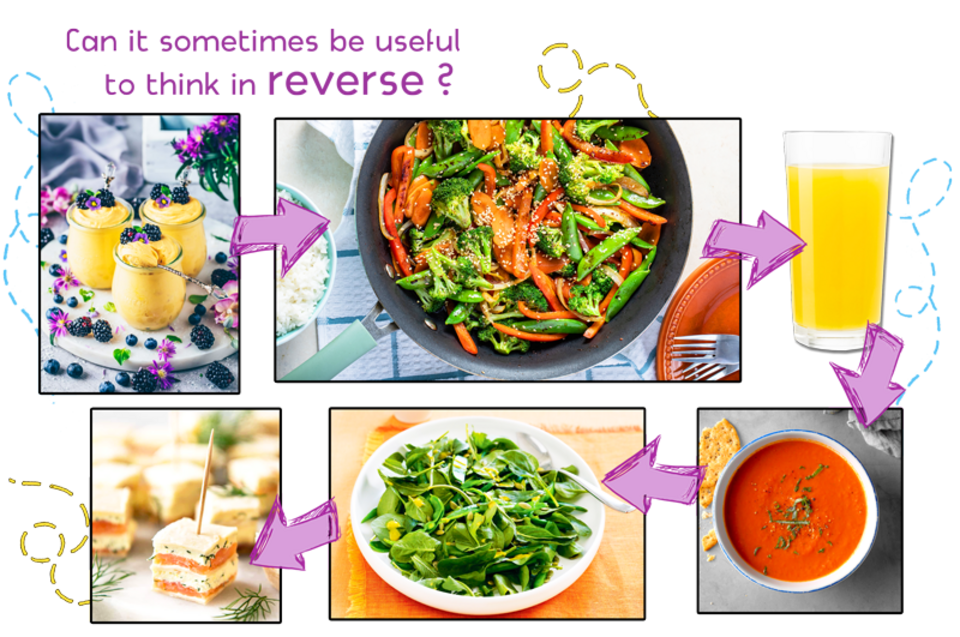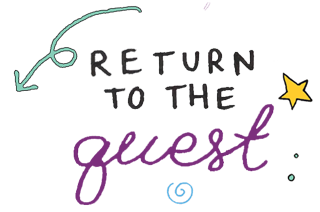
Laem reversal
| Objective: To flip your ideas about reversal on their head by having a backwards dinner! |
Duration: 30 to 75 minutes
Material:
- A topsy-turvy family
- A three-course meal (starter, main, dessert)
Instructions:
- Prepare the revolution. To revolutionize your meal tonight, suggest that your family eat your meal... backwards! There are two ways to eat a meal backwards: the first, easier way is to prepare a normal meal with a starter, a main course and a dessert and to eat it starting with the dessert and ending with the starter. Here both the flavours and the appearances are reversed. The second way is to prepare a starter that looks like a dessert (for example: savoury cookies, vegetable mousse) and a dessert that looks like a starter (for example: sweet tabbouleh, fruit soup) and to start by eating the (fake) dessert, then the main course, then the (fake) starter. Here only the appearances are reversed. Discuss this with the person who is cooking tonight to choose what works best for you.
- Lead the revolution. Eat your meal backwards, taking the time to observe how it feels.
- Think about the revolution. Now that you've reached the end (or is it the beginning?) of the meal, discuss the following questions together: what changes when you eat your meal backwards? Are there other things in our lives that we should reverse? Can it sometimes be helpful to think about what the exact opposite of our opinion is? Why or why not? What about "reverse-engineering," that is, thinking about a process from the end and working your way back to the beginning?
...
Bonus: If you still have the munchies, here's another activity to chew on: for the rest of the evening, reverse the roles of parents and children! How are you going to decide what activities to do, what rules to follow and what time to go to bed? Through a fair negotiation... or through iron-fisted authority? Who's going to clean and tidy up? Will the tasks be shared... or left to the “grown-ups?” Use this experience to discuss the usual division of labour and power in your family. The following questions may be helpful to consider: can it be justified for some people to have less power... in a family? ... in a school? ... in a society? Is it important to reverse the positions of power from time to time? Is it possible for an adult to see how difficult a child's life is and vice versa? |

| Tricks for tots: To help you think about the concept of reversal, here's a little game to play as a family before or after dinner! Depending on how much time you have, you can play slowly or quickly. Get into a room with space to move. Start by lying on the floor and imagine that you are a human being who has died of old age. Then time starts going backwards: move around like an elderly person. Then like an adult. Like a teenager. Like a child. Like a baby. Like a fetus in its mother's tummy. The reversal of time is accelerating: now move around like a caveman, like a monkey, like a rodent, like a land reptile, like a fish, like a small water worm, like a bacterium and then... stop. You have arrived at the beginning of life. How does it feel to have travelled back in time? If you could go back in time, what event in your own life would you want to relive, and why? Does the fact that you can only experience an event once make it more precious... or is it tragic? |
Tips for teens: Here's a little challenge of logic—the branch of philosophy that analyzes the rules of argumentation and reasoning—to tackle as a family! Try to see if the different permutations of the following true sentence are also true, "If it’s raining, then the grass is wet." ("If A, then B"):
The solution? Only the contrapositive ("If not-B, then not-A") is true! The converse ("If B, then A") is false because the grass could have been wet by something other than the rain. And the inverse ("If not-A, then not-B") is also false, because the grass could be wet despite the absence of rain, for example if someone watered it. These rules are not limited to grass and rain: try to imagine your own sentences and permutations! Having a good grasp of logical connections can help us guard against people who want to confuse us and get us to believe things that are not necessarily true. |
Share your creative reflections by sending them via email.
Include photos of your projects and notes of your thoughts, as well as your first name and your age!


